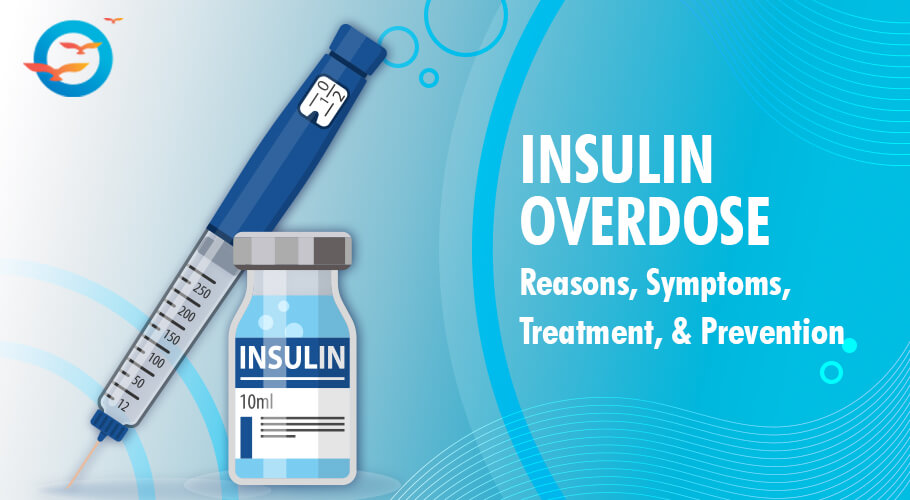Insulin Overdose: Reasons, Symptoms, Treatment and Prevention

Diabetes is brought on by a condition known as insulin resistance. This occurs when the body is unable to produce sufficient insulin or cannot use the insulin produced by the pancreatic beta cells. In either case, insulin needs to be administered externally so the body can properly absorb the sugar, which is obtained from the food we eat. But insulin dosages need to be accurately calculated to avoid life-threatening situations.
Insulin Overdose Causes
- Individual needs
This is because insulin dosages vary from person to person. A dose that might be normal for one person could be high for another.
- Timing
Insulin requirements also vary through the day; morning breakfast, for instance, could require a higher unit than afternoon mealtimes. This could be due to a number of reasons: there may already be a certain quantity of insulin in the body, or the person may have exercised or been physically active, or vice versa.
- Release speed
Another variable that could cause an overdose is release speed. Meal time insulin is usually quick acting—varying from about 15 minutes to an hour. Basal insulin, on the other hand, is a longer lasting, slow-release form of insulin. It can last 24 hours or longer in the body.
Strength: Insulin concentration is usually 100 units per ml—referred to as U 100. However, depending on a person’s needs higher concentrations—up to U 500 are also available.
Types of Insulin
1. Basal
It helps to understand that there are two broad types of insulin: basal—a long-lasting dose that stays in the body for a greater period of time, ensuring that blood sugar levels remain steady; and bolus—a kind of booster dose that is required when there’s a surge in glucose, for instance, mealtimes.
2. Bolus
Diabetics need to take a bolus dose because their bodies need the added insulin to handle the extra sugar obtained through the meal consumed. Without the bolus dose, the sugar in the blood will not be able to enter the cells, resulting in excess glucose in the blood, and insufficient glucose, which is needed for energy, inside the cells.
All the above-mentioned factors must be computed in determining the correct insulin dose for a diabetic. Failure to do this can result in the person overdosing, and this can result in life-threatening hypoglycemia, i.e. low blood sugar.
Hypoglycemia Symptoms
- Fugue—confusion
- Irritability
- Depression &/anxiety
- Weakness, dizziness
- Elevated heartbeat
- Sweating, often accompanied by chills
- Blurring of vision
Hypoglycemia Treatment
Mild hypoglycemia
Mild hypoglycemia can easily occur if a person makes a mistake in calculating insulin dose or simply eating less than they had anticipated—or not eating at all.
It can be quickly addressed in a few steps, as below
- Check BSL to determine if they have hypoglycemia—glucose levels below 70 mg/dl indicate hypoglycemia
If levels indicate hypoglycemia, quickly consumption, a fast-acting glucose drink, e.g. high sugar fruit juice, soda, candy or just a sugar lump
- If overdose has occurred because the person failed to eat, ensure they have their meal after consuming the glucose. This will raise the glucose in the blood, but steadily.
- Hypoglycemia can be disorienting. The person should therefore rest to allow the body some time to normalize
- Recheck blood sugar. About 15 minutes after doing the above, retake the blood sugar test to see if the steps above have worked. If symptoms still persist, and readings show that levels are still not normal, the person should be given medical treatment.
Severe Cases
If the person is unresponsive and unable to follow the above steps, apply some glucose gel, or honey, inside the cheek. If the person is comatose, do not put anything inside the mouth as it can cause choking.
Diabetics should ensure they always carry the following:
- Glucagon kit: this consists of sterile water, a syringe and glucagon. These contents should be mixed and injected to counter a severe insulin overdose
- Medical ID. This is needed so bystanders know that the symptoms have been caused by diabetes. This information should be conveyed to emergency medical professionals.
- Even if the person feels better after the glucagon injection, they still need to visit a doctor or a medical center. The doctor will administer an intravenous dextrose and electrolyte solution to counteract the overdose, and the person will be monitored to ensure there is no long term damage
How to Prevent Insulin Overdose?
The best way to prevent insulin overdose is to reduce the risks of making a mistake. The following actions can help keep you safe from the overdosing
- Read packaging information carefully.
If anything is not clear, speak to a doctor or pharmacist. - Double-check insulin type.
If you don’t organize doses properly and keep a record, it is easy to accidentally take a fast-acting bolus dose instead of basal. - Don’t skip meals.
Skipping meals can cause insulin overdose. If the fast-acting insulin is taken before the meal, be sure the meal is ready. Try sitting at the table to eat, before taking the dose. - Keep thorough records.
Errors in the calculation are notorious for causing overdoses; there are many apps to help calculate carb-insulin ratios. Using one of these reduces the margin of error.
If there are others in your home, who are maybe on a different dose of insulin, store your insulin separately, so there is no inadvertent mix-up. In addition to the above precautions, do let your doctor know of your medical needs, and keep them informed of your insulin, dose, etc.
Insulin is a serious medication and dosages need to be properly calculated and administered. If you are on insulin it is important to have proper medical supervision. This is why the medical protocol is one of the four basic protocols—in addition to diet, exercise and inner transformation—on which our diabetes reversal programs are based. For more information about our diabetes reversal programs.
Read FAQs on this topic:
-
What are the common symptoms of an insulin overdose?
Symptoms include confusion, dizziness, sweating, rapid heartbeat, and severe cases of unconsciousness or seizures. -
How is an insulin overdose treated?
Treatment typically involves consuming fast-acting carbohydrates (e.g., glucose tablets, juice) and seeking immediate medical attention if symptoms are severe. -
How can insulin overdoses be prevented?
Prevention includes carefully monitoring blood sugar levels, following prescribed insulin doses, and maintaining a consistent eating schedule.

